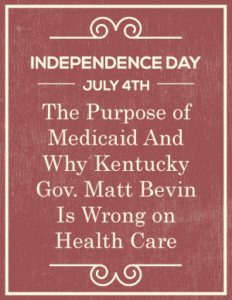 When the Declaration of Independence was signed in 1776 by wealthy white colonists, its lofty words were announcing independence from England on behalf of a small sliver of men living in the American colonies.
When the Declaration of Independence was signed in 1776 by wealthy white colonists, its lofty words were announcing independence from England on behalf of a small sliver of men living in the American colonies.
But in the intervening 200 years, through sacrifice and heart break, a Constitution, legislation and protest, we have widened the circle of inheritors to the lofty promises of the country’s resounding declaration of independence – namely that all people who call this nation home have the right to “life, liberty, and the pursuit of happiness.”
Medicaid, the federal-state program created to furnish low-income individuals with access to quality health care, is one way that the United States better lives into the promise of “life, liberty and the pursuit of happiness.” Long slandered by its critics, Medicaid is an American success story. The program is the largest health insurance provider in the country, covering 1 in 5 people. Three-fourths of the public, including majorities of Democrats (84 percent), independents (76 percent), and Republicans (61 percent), hold a favorable view of Medicaid. Medicaid’s favorability is even stronger among those who use the program; a study published in 2017 by Harvard’s Chan School of Public Health reveals that people enrolled in Medicaid are overwhelmingly satisfied with their coverage and care. Medicaid enrollees gave the program an average rating of 7.9 out of 10, where 10 was considered “the best health care possible.” That far exceeds satisfaction of people dealing with private insurance plans.
Medicaid’s importance goes beyond how well it polls with the public or how much it will impact this or that election. Support for Medicaid is a moral issue that, more than ever, asks the question, “what does the United States stand for as a nation?” Medicaid is a promise that low-income individuals and families are not held down by sickness and lack of access to health care. In the world’s richest country, an illness should not be a death sentence, nor cause bankruptcy. Health is essential to allow every individual to live into her full potential, and no one should be robbed of that by virtue of what they cannot afford. To quote former U.S. Solicitor General Don Verrilli, “a right to health care is essential to enjoying the blessings of liberty,” or, phrased another way, “without access to health, what good are life, liberty and the pursuit of happiness?”
But despite Medicaid’s intrinsic social good and widespread popularity, the law is under attack again by conservative activists and ideologues. For years, they have waged a campaign to discredit the program’s popularity, spreading false information and inciting resentment against those “other” people who need government help to get health care services. More recently the Trump administration has become the champion for undoing Medicaid. Last year’s Affordable Care Act repeal efforts would have restructured Medicaid into an almost unrecognizable, and far weaker, program. Luckily those repeal efforts failed, thanks to public outcry and the realization that no family is immune from health care challenges they may be unable to meet on their own. But the Trump administration didn’t give up; it has just switched gears (temporarily) and is now seeking to weaken, if not destroy, Medicaid through administrative processes, actively encouraging states to take part in dismantling Medicaid. The National Health Law Program just won a major court case against the administration’s efforts to impose barriers to Medicaid access in Kentucky. The win, however, is just the beginning of a long and difficult battle.
This Independence Day the United States stands at a crossroads. We could easily slide down one path, in which rights become privileges available only to the rich and powerful. Or we could take the more difficult path that leads to a country where health is a fundamental right that must be protected in order for all to enjoy the liberties promised in the U.S. Constitution. That’s the country I want to celebrate on this Independence Day.